Friday, November 23, 2007
Tracking FDI, a maddening affair
There is nothing more frustrating than figuring out Foreign direct investment in Venezuela, there are no reliable standards (even within articles themselves) that you can point to. And even if you did find one there are no ways to separate net FDI from simply foreign investment (nationalizations obscure the number).
That said I came across a neat little graph from the Central Bank

Despite the negative spin from the media this would be awesome really, after you account for the one time nationalizations in Q1 and Q2 FDI you would see that Q3 investment rose slightly when compared with Q3 2006, now admitedly this is only one Quarter but if it holds it does look good.
Then we see an article from El Universal that paints a bleaker picture.

As you can see they use the Central Bank figures for the first 9 months of 07, but they do not use the figure for 06 from the bank itself. They use the figures from CEPAL regarding FDI.

Yes it is misleading on the part of El Universal, but what can you do about it, more troubling is the different numbers we get from the Central Bank and CEPAL for 2006. Both use net investment, CEPAL acknowledges that in 06 the slashing of the operating agreements fudged the numbers, but still for one to report 4.4 billion in FDI while the other reports negative numbers is maddening.
Evidently the opposition will no doubt claim AHA! regarding possibly shoddy numbers (like they always claim to do but always fail to show) but this is the Central Bank, an entity only the delusional would claim is under the wing of the govt and whose autonomy is still pretty much under the 99 constitution. So what gives? I really don't have a clue, but I guess I should start digging into the Central Bank website for more numbers, before the eventual change of the website to red strains my eyes ;)
PS this is entirely an academic excercise, Venezuela gets more from oil than China gets from net FDI so there is really nothing to worry about.
PPS There are now 141 drills in the country
|
That said I came across a neat little graph from the Central Bank

Despite the negative spin from the media this would be awesome really, after you account for the one time nationalizations in Q1 and Q2 FDI you would see that Q3 investment rose slightly when compared with Q3 2006, now admitedly this is only one Quarter but if it holds it does look good.
Then we see an article from El Universal that paints a bleaker picture.

As you can see they use the Central Bank figures for the first 9 months of 07, but they do not use the figure for 06 from the bank itself. They use the figures from CEPAL regarding FDI.

Yes it is misleading on the part of El Universal, but what can you do about it, more troubling is the different numbers we get from the Central Bank and CEPAL for 2006. Both use net investment, CEPAL acknowledges that in 06 the slashing of the operating agreements fudged the numbers, but still for one to report 4.4 billion in FDI while the other reports negative numbers is maddening.
Evidently the opposition will no doubt claim AHA! regarding possibly shoddy numbers (like they always claim to do but always fail to show) but this is the Central Bank, an entity only the delusional would claim is under the wing of the govt and whose autonomy is still pretty much under the 99 constitution. So what gives? I really don't have a clue, but I guess I should start digging into the Central Bank website for more numbers, before the eventual change of the website to red strains my eyes ;)
PS this is entirely an academic excercise, Venezuela gets more from oil than China gets from net FDI so there is really nothing to worry about.
PPS There are now 141 drills in the country
|
Thursday, November 22, 2007
"Chávez is taking our homes and Children!"
"And might eat them, too."- Globovisión watching contra
Greg Wilpert has a overall summary of the entire reform here: http://www.venezuelanalysis.com/analysis/2889
|
| 1999 Article 82: Every person has the right to adequate, safe and comfortable, hygienic housing, with appropriate essential basic services, including a habitat such as to humanize family, neighborhood and community relations. The progressive meeting of this requirement is the shared responsibility of citizens and the State in all areas. The State shall give priority to families, and shall guarantee them, especially those with meager resources, the possibility of access to social policies and credit for the construction, purchase or enlargement of dwellings. | Proposed reform: Article 82: Every person has the right to...the same as 1999 The State shall give ... the same as 1999 This is amended at the end of previous 1999 article: All persons have the right to defend their or their familes homes, declaring it as their primary housing before the organs of the People's Power, and as such, no preventative or executive measures of a judicial character can be made against it without further limitations then those in the law or conventions against it. |
Greg Wilpert has a overall summary of the entire reform here: http://www.venezuelanalysis.com/analysis/2889
|
Wednesday, November 21, 2007
While exports go nowhere milk flies off the shelves.
In today's El Universal newspaper they had an article on Venezuela's non-oil exports with an interesting chart. It is viewed as critical by many, including this blogger, that Venezuela expand its non-oil exports if it is to develop economically and improve its populations standard of living. Unfortunately, when we look at the numbers we see that is not happening, or at least not to any significant extent:
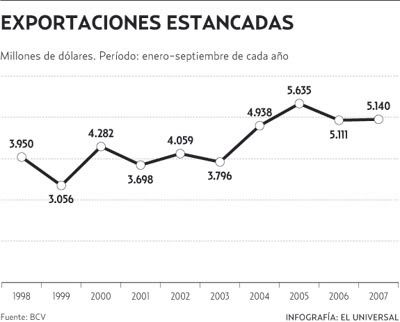
Note that these numbers are for the first 9 months of each year which is why they may appear somewhat lower than we have seen in other charts.
Clearly, non-oil exports aren't going anywhere very fast. They have trended up some under Chavez's government but nowhere near as fast as they should. For example, during South Korea's high growth phase their exports grew about 30% per year. Venezuela's haven't grown that much over the past eight years. No one should be happy with this performance.
At the same time it also should be noted that this chart rebutts some of the doom and gloom nonsense we constantly hear from Chavez's opponents. After all, while their growth may not be what we would want non-oil exports have in fact grown under Chavez. That is, Venezuela exported FEWER non-oil products when Chavez's opponents were running the show. So the typical opposition assertion that the country is going to hell is non-sense, it just isn't getting better anywhere as fast as it should.
Of course, by this point I assume all readers of this blog know at least one measure the Venezuelan government could adopt to help boost non-oil exports.
Now, if exports are just plodding along milk is doing anything but that. I am sure by now we have all heard the horror stories about milk "shortages". Like Mark Twain's death they are greatly exagerrated. However, there are many times when it is difficult to find certain products, including milk, on the shelves of grocery stores.
Does that mean there is less milk? Not at all. In this article from today's El Universal the president of the supermarket chain Makro says there whereas before they were getting 300 containers of milk per week now they are getting 500. Unfortunately (or fortunately, depending on your point of view) all this milk just doesn't hang around on store shelves very long.
Why? Well according to the president of Makro there has been an "avalanche" of increased consumption from social classes C, D, and E (for those who don't remember what those social classes are they are basically the ignorant, lazy and unkempt masses who keep voting for that scumbag Chavez) which have seen their purchasing power greately expanded.
So there aren't any true shortages of milk - it is simply that consumption is up a lot more than demand can keep up with and hence it is sometimes unavailable because it has sold out.
Now, the same problem has happened with automobiles. Venezuelan's will buy an all time record number of automobiles this year, about 500,000. Demand is so strong that many people are on waiting lists for 6 months before they can get their car.
Oddly we never read about "car shortages" in Venezuela. I suppose "car shortages" just don't have the same drama factor as "milk shortages".
Anyways, the bad news here is this is likely to get worse. It was also reported today that the unemployment rate went down. That is due to 436,000 new jobs having been created in the past year, 324,000 of those new jobs in the formal sector. More people with jobs and money could mean tough times ahead for milk (and car) lovers. Stay tuned.
[BTW, you would think an economy the size of Venezuela's creating 436,000 new jobs would be news, but somehow I suspect most all of the english language media the world over will manage to ignore it. I guess it must be because only bad news sells newspapers. Anyone have ideas on how to spin the creation of 436,000 new jobs as bad news?]
|

Note that these numbers are for the first 9 months of each year which is why they may appear somewhat lower than we have seen in other charts.
Clearly, non-oil exports aren't going anywhere very fast. They have trended up some under Chavez's government but nowhere near as fast as they should. For example, during South Korea's high growth phase their exports grew about 30% per year. Venezuela's haven't grown that much over the past eight years. No one should be happy with this performance.
At the same time it also should be noted that this chart rebutts some of the doom and gloom nonsense we constantly hear from Chavez's opponents. After all, while their growth may not be what we would want non-oil exports have in fact grown under Chavez. That is, Venezuela exported FEWER non-oil products when Chavez's opponents were running the show. So the typical opposition assertion that the country is going to hell is non-sense, it just isn't getting better anywhere as fast as it should.
Of course, by this point I assume all readers of this blog know at least one measure the Venezuelan government could adopt to help boost non-oil exports.
Now, if exports are just plodding along milk is doing anything but that. I am sure by now we have all heard the horror stories about milk "shortages". Like Mark Twain's death they are greatly exagerrated. However, there are many times when it is difficult to find certain products, including milk, on the shelves of grocery stores.
Does that mean there is less milk? Not at all. In this article from today's El Universal the president of the supermarket chain Makro says there whereas before they were getting 300 containers of milk per week now they are getting 500. Unfortunately (or fortunately, depending on your point of view) all this milk just doesn't hang around on store shelves very long.
Why? Well according to the president of Makro there has been an "avalanche" of increased consumption from social classes C, D, and E (for those who don't remember what those social classes are they are basically the ignorant, lazy and unkempt masses who keep voting for that scumbag Chavez) which have seen their purchasing power greately expanded.
So there aren't any true shortages of milk - it is simply that consumption is up a lot more than demand can keep up with and hence it is sometimes unavailable because it has sold out.
Now, the same problem has happened with automobiles. Venezuelan's will buy an all time record number of automobiles this year, about 500,000. Demand is so strong that many people are on waiting lists for 6 months before they can get their car.
Oddly we never read about "car shortages" in Venezuela. I suppose "car shortages" just don't have the same drama factor as "milk shortages".
Anyways, the bad news here is this is likely to get worse. It was also reported today that the unemployment rate went down. That is due to 436,000 new jobs having been created in the past year, 324,000 of those new jobs in the formal sector. More people with jobs and money could mean tough times ahead for milk (and car) lovers. Stay tuned.
[BTW, you would think an economy the size of Venezuela's creating 436,000 new jobs would be news, but somehow I suspect most all of the english language media the world over will manage to ignore it. I guess it must be because only bad news sells newspapers. Anyone have ideas on how to spin the creation of 436,000 new jobs as bad news?]
|
The untouchables
There are certain people in the world that are untouchable by the law, for whatever reason. In Venezuela two such untouchables came to blows. Firebrand Iris Valera and Gustavo Azocar.
The latter decided to write a book attacking Iris Valera and using her dead son as the spearhead, here is an slice in Spanish.
The author is an untouchable because he is a crook (lotery scams) but since he is a reporter the government was forced to pardon him, he is a slanderer but Iris Valera could not sue him for the opposition would get a martyr, so she decided to slap him multiple times.
Hopefully this creep gets fined heavily under the LOPNA (child protection laws) but international criticism from the right wing NGOs might prevent that, As for Iris I can forgive her actions as a passionate outburst.
Edit: In the US journalists are jailed without a fair trial, but who do these NGOs like RSF and SIP defend? their source of income of course.
http://afp.google.com/article/ALeqM5hrXLdLkkrNX6TjsQ-Kp_qzn109wQ
|
The latter decided to write a book attacking Iris Valera and using her dead son as the spearhead, here is an slice in Spanish.
IRIS: LA MADRE QUE NO PUDO SER (Iris the mother that she could never be)
En el Hospital Central de San Cristóbal hay una historia que tiene que ver con la vida de Iris Varela y que puede ser clave para entender su comportamiento, su agresividad, su odio visceral contra algunos sectores políticos de la oposición y su resentimiento. El relato, confirmado por algunos médicos y enfermeras que prefieren mantenerse en el anonimato, refiere que María Iris fue llevada a la sala de partos en el año 1992 con un embarazo complicadísimo que, pese al gran esfuerzo de los médicos que estaban de guardia, terminó en tragedia. “Los médicos y las enfermeras hicieron todo cuanto estuvo a su alcance para salvar al bebé. Me consta que se hizo todo cuanto fue posible, pero el parto fue tan difícil y tan complicado, que el niño no pudo salvarse. Aguantó dos semanas y luego falleció”, dijo una médico tachirense.
La médico contó que María Iris logró dar a luz, pero el bebé nació con demasiadas complicaciones, algunas de ellas congénitas. Lo mantuvieron en terapia intensiva durante quince días, pero los esfuerzos resultaron en vano. María Iris entró en cólera cuando los galenos le informaron que el niño había muerto.
Aquella noche inundó de maldiciones la sala de partos del Hospital Central de San Cristóbal yjuró que se vengaría de todos los que estaban allí presentes. “Tratamos de explicarle que las condiciones del niño eran muy dificiles, que las posibilidades de que el niño viviera eran mínimas, pero ella no escuchó. Toda la noche profirió maldiciones contra cada uno de nosotros. Nos mentó la madre como mil veces y cuando abandonó el hospital al día siguiente, juró que la pagaríamos con nuestra propia sangre”.
En ocasiones, María Iris Varela ha dicho, tanto en privado como en público, que a su hijo se lo mató la cuarta república. Ha señalado, incluso, que como el parto se produjo en el 92, luego del golpe de estado liderado por el Comandante Hugo Chávez, que en los hospitales había animadversación y rechazo hacia quienes estaban identificados con la intentona golpista. Algunos sicólogos creen que ese acontecimiento marcó para siempre la vida de la diputada y que el recuerdo del hijo que nunca pudo tener la acompañará siempre como una huella indeleble.
The author is an untouchable because he is a crook (lotery scams) but since he is a reporter the government was forced to pardon him, he is a slanderer but Iris Valera could not sue him for the opposition would get a martyr, so she decided to slap him multiple times.
Hopefully this creep gets fined heavily under the LOPNA (child protection laws) but international criticism from the right wing NGOs might prevent that, As for Iris I can forgive her actions as a passionate outburst.
Edit: In the US journalists are jailed without a fair trial, but who do these NGOs like RSF and SIP defend? their source of income of course.
The Associated Press was notified that the military planned to seek criminal charges on November 14.
"While we are hopeful that there could be some resolution to Bilal Hussein's long detention, we have grave concerns that his rights under the law continue to be ignored and even abused," AP President and CEO Tom Curley said in a statement.
"The steps the U.S. military is now taking continue to deny Bilal his right to due process and, in turn, may deny him a chance at a fair trial.
"The treatment of Bilal represents a miscarriage of the very justice and rule of law that the United States is claiming to help Iraq achieve," the AP statement said.
"At this point, we believe the correct recourse is the immediate release of Bilal."
http://afp.google.com/article/ALeqM5hrXLdLkkrNX6TjsQ-Kp_qzn109wQ
|
Tuesday, November 20, 2007
Hoping they keep their eyes on the road
This is a blog mainly about Venezuela and I generally don't go too far astray. However, this article in today's New York Times really caught my eye (no pun intended):
Now, regular readers will know I am know fan of Cuba's government. As far as I am concerned the sooner the oppresive Castro regime is gone and makes way for freedom and democracy the better.
At the same time, it is impossible not be moved by the deeds described above. These are human being with very real needs and it is fantastic that someone is helping them. While reading this I thought to myself for a second "why can't the U.S. use some of its vast resources to do this too". Then I snapped back to reality and remembered the U.S. doesn't even do this for a good share of its own population.
Sometimes I feel we are trapped between two different versions of hell. In one version people live in an oppresive environment and lack basic freedoms. In another one, indifference to basic human needs brutalizes millions of people. Surely there must be some other way than these two unacceptable choices?
Of course, Venezuela seems to be looking for, and maybe even finding, a way between the two - doing everything it can to meet the needs of much neglected segments of the population while still respecting peoples very important political rights. This is what makes observing the Venezuelan experiment so worthwhile.
But at the same time I feel that watching Venezuela is like watching a bus speeding along a winding road in the Andes mountains. The bus often seems out of control and could go over a cliff at any moment. To one side is a cliff that would take Venezuela back to being a country where the people running things don't care about the bottom half of the society. To the other side there is a cliff that leads to a totalitarian hell where only one person's opinions matter.
I really hope the bus stays on the road. But being powerless over any of this all I can do is hope.
|
A Health System’s ‘Miracles’ Come With Hidden Costs
HAVANA, Nov. 16 — A shiny new tour bus pulled up to the top eye hospital in Cuba on a sunny day this month and disgorged 47 working-class people from El Salvador, many of whom could barely see because they had thick cataracts in their eyes.
Among them were Francisca Antonia Guevara, 74, a homemaker from Ciudad Delgado whose world was a blur. She said she had visited an eye doctor in her home country but could not pay the $200 needed for artificial lens implants, much less pay for the surgery.
“As someone of few resources, I couldn’t afford it,” she said. “With the bad economic situation we have there, how are we going to afford this?”
Cuba’s economy is not exactly booming either, yet within two hours Ms. Guevara’s cataracts were excised and the lenses implanted, with the Cuban government paying for everything — including air transportation, housing, food and even the follow-up care.
The government has dubbed the program Operation Miracle, and for the hundreds of thousands of people from Venezuela, Central America and the Caribbean who have benefited from it since it was started in July 2004, it is aptly named.
.............................
The Cuban authorities say they have treated more than 750,000 people for eye conditions like cataracts and glaucoma since the program started.
At the same time, Cuban doctors have set up 37 small eye hospitals in Latin America, the Caribbean and Mali. Twenty-five of the centers are in Venezuela and Bolivia, whose leaders have close ties to the Castros. The hospitals are staffed with more than 70 top-notch eye surgeons from Cuba and hundreds of other nurses and ophthalmologists.
Dr. Sergio M. Vidal Casali, 84, has worked at the Ramón Pando Ferrer Cuban Institute of Ophthalmology for more than 50 years, specializing in diseases of the retina. He said the heavy flow of foreign patients through the hospital, combined with the exodus of several physicians to other countries, had hurt his department. “I don’t like it, really,” he said. “It’s wonderful for the people, but not for us. It disturbs our work.”
Dr. Reynaldo Rios Casas, the director of the institute, said the first days of the program were hectic. Eye surgeons worked in three shifts, keeping the hospital’s operating rooms going all day and all night. It was not uncommon for a single surgeon to perform 40 operations in a shift.
“It was really heroic,” he said. “We were operating day, afternoon and night.”
....................................
In recent years, the program has allowed Cuba to use its doctors as barter for subsidized Venezuelan oil and to forge closer relations with other countries in the region, including those, like El Salvador, that have not been historically close to the Communist regime here.
Of course, the people who have their sight restored could not care less about the political and economic repercussions of the program. For them, the offer of free surgery was a dream come true.
Mrs. Guevara, whose husband is a retired construction worker from San Salvador, said she had given up hope of seeing again. She heard about the Cuban project on a Mayan radio station. “I never imagined anyone would help me the way they have helped me,” she said as she waited for surgery. “I thought I was going to end up blind.”
Near her in the waiting room was Reina López, 58, of San Vicente, El Salvador, who has not been able to see for 13 years because of cataracts. Her daughter, Adilia Reyes, 33, said she had cared for her mother since she lost her sight. The family, including four children, survives on her father’s salary of $3 a day, plus whatever fruit can be sold at a market on Saturdays.
“For the poor, this is a tremendous benefit,” she said, as she guided her mother to a presurgery test. “If it works, we’ll be so grateful.”
Downstairs in the cafeteria, Manuel Agustín Isasi, 33, a professional fencing coach from Islas Margaritas in Venezuela, was eating a lunch of pork, rice and beans, able for the first time in years to see his food with both eyes. Three years ago, he had been whitewashing his home when he accidentally burned both corneas with a bucket of quicklime. The accident ended his fencing career.
He had been one of the first to receive a cornea transplant in his left eye when the program started, he said. Then, in early November, doctors in Havana replaced the cornea in his right eye. He was unabashed in his praise for the Cuban government and for President Hugo Chávez of Venezuela.
“I would have remained completely blind,” he said, fixing a reporter with a swordsman’s gaze. “Vision is half of one’s life.”
Now, regular readers will know I am know fan of Cuba's government. As far as I am concerned the sooner the oppresive Castro regime is gone and makes way for freedom and democracy the better.
At the same time, it is impossible not be moved by the deeds described above. These are human being with very real needs and it is fantastic that someone is helping them. While reading this I thought to myself for a second "why can't the U.S. use some of its vast resources to do this too". Then I snapped back to reality and remembered the U.S. doesn't even do this for a good share of its own population.
Sometimes I feel we are trapped between two different versions of hell. In one version people live in an oppresive environment and lack basic freedoms. In another one, indifference to basic human needs brutalizes millions of people. Surely there must be some other way than these two unacceptable choices?
Of course, Venezuela seems to be looking for, and maybe even finding, a way between the two - doing everything it can to meet the needs of much neglected segments of the population while still respecting peoples very important political rights. This is what makes observing the Venezuelan experiment so worthwhile.
But at the same time I feel that watching Venezuela is like watching a bus speeding along a winding road in the Andes mountains. The bus often seems out of control and could go over a cliff at any moment. To one side is a cliff that would take Venezuela back to being a country where the people running things don't care about the bottom half of the society. To the other side there is a cliff that leads to a totalitarian hell where only one person's opinions matter.
I really hope the bus stays on the road. But being powerless over any of this all I can do is hope.
|
¡Todo el Poder al Pueblo! All Power to the People!
Because the people are the only defense against an "endogenous right." *
* endogenous right refers to detrimental self-serving elements within the Bolivarian movement.
|
| 1999 Article 70: Participation and involvement of people in the exercise of their sovereignty in political affairs can be manifested by: voting to fill public offices, referendum, consultation of public opinion, mandate revocation, constitutional and constituent legislative initiative, open forums and meetings of citizens whose decisions shall be binding among others; and in social and economic affairs: citizen service organs, self-management, co-management, cooperatives in all forms,including those of a financial nature, savings funds, community enterprises, and other forms of association guided by the values of mutual cooperation and solidarity. The law shall establish conditions for the effective, functioning of the means of participation provided for under the present article. So OW mentioned that not much capital exist's in the country to speak of. However, the transfer of direct power al pueblo, represented here, helps them to further defend and organize for control over the "excess" value created by their communites. As the country develops, the people organized are the key to success, no matter what rabid reaction may come from present and future national or international contra. Which is why we can expect the US and Europe to step up the bullshit through their private propaganda apparatus regarding this reform and the process in general. In their eye's this is an example that can not be tolerated. - Aliva | Proposed reform: Article 70: Participation and involvement of the people in the direct exercise of their sovereignty and in the construction of Socialism, is manifested by: voting to fill public offices, referendum, consultation of public opinion, mandate revocation, constitutional and constituent legislative initiative, open forums, Citizen Assemblies who's decisions will be binding in their respective territorial areas, as long as they do not contravene with that established in this constitution and the law; Council's of the People's Power in the form of communal councils,workers councils, student's councils, farmer councils, artisan's councils, fishermen's councils, sports councils, youth councils, elder adult's councils, woman's councils, incapacitated people's councils, amongst others, democratic management by the workers of direct or indirect social property enterprises, the autonomous commune, communal finance and micro-finance organizations, cooperatives of communal property, communal savings funds, networks of free associated producers, voluntary work, community enterprises and other forms of association created to develop the values of mutual cooperation and socialist solidarity. A national law will establish the conditions for the effective organization and functioning of the means of participation listed in this article |
| 1999 Article 136: Public Power is distributed among Municipal Power, that of the States Power and National Power. National Public Power is divided into Legislative, Executive, Judicial, Citizen and Electoral. Each of the branches of Public Power has its own functions, but the organs charged with exercising the same shall cooperate with one another in attaining the ends of the State. | Proposed reform: Article 136: Public Power is distributed territorially in the following manner: People's , Municipal, State , and National power's. In relation with the functions that it exercises, the National Public Power is divided into Legislative, Executive, Judicial, Citizen and Electoral. Sovereignty lies with the people and is exercised directly through the People's Power. This power is not born from suffrage or any election but from the condition of groups of humanity organized as the base of the population. The People's Power consisting of communities, communes, and autonomous city governments is expressed through communal councils, worker councils, student councils, farmer's councils, artisan's councils, fishermen's councils, sports councils, youth councils, elderly adult's councils, woman's councils, incapacitated people's councils, and other bodies that the law designates. |
| 1999 Article 157: The National Assembly, by a majority vote of its members, shall have the power to delegate to the States or Municipalities certain matters under national competence, in order to promote decentralization. | Proposed reform: Article157: The National Assembly, by a majority vote of its members, shall have the power to delegate to the organs of the People's power, the Federal District, Municipalities, and States various tasks of national competence in order to promote protagonist and participative democracy and the direct exercise of sovereignty. |
| 1999 Article 158: Decentralization, as a national policy, must add depth to democracy, bring power closer to the people and creating optimum conditions both for the exercise of democracy and for the effective and efficient Fulfillment of government commitments. | Proposed reform: Article 158: As national policy the state shall promote the involement and participation of the people, transferring to them the power and creating the best conditions for the construction of a Socialist Democracy. |
| 1999 Article 184: Open and flexible mechanisms shall be created by law to cause the States and Municipalities to decentralize and transfer to communities and organized neighborhood groups services the latter manage and demonstrate the ability to provide, promoting: (1)The transfer of services in the areas of health, education, housing, sports, culture, social programs, the environment, maintenance of industrial areas, maintenance and upkeep of urban areas, neighborhood prevention and protective services, construction of public works projects and providing of public services. To this end, they shall have the power to enter into agreements, whose content shall be guided by the principles of interdependence, coordination, cooperation and shared responsibility. (2)Participation by communities and citizens, through neighborhood associations and nongovernmental organizations, in the formulation of investment proposals for presentation before the state and municipal authorities in charge of preparing the pertinent investment plans, as well as participation in the execution, evaluation and control of works projects, social programs and public services within their jurisdiction. (3)Participation in economic processes, stimulating manifestations of the social economy, such as cooperatives, saving funds, mutual funds and other forms of association. (4)Participation by workers and communities in the running of public sector business enterprises, through self-management and joint management methods. (5)Creation of community service enterprises, organizations and cooperatives as mechanisms to generate employment and social welfare, providing for their permanent existence through the design of policies whereby these groups are given means of participating. (6)Creation of new decentralized organs at the parish, community, ward and neighborhood levels, with a view to guaranteeing the principle of shared responsibility in the public administration of local and state governments, and developing process of self management and joint management in the administration and control of state and municipal public services. (7)Participation by communities in activities to establish closer ties with penal institutions and ties between the latter and the general population. | Proposed reform: Article 184: A National Law will create mechanisms so that the National Power, States, and Municipalities decentralize and transfer to the organized communities, communal councils, communes, and other entities of the People's Power the services they manage, promoting: (1)Same as 1999 but the sentence starting with "To this end, they shall have..." is removed. (2)Admission and participation by communal organizations in the administration of public state or municipal enterprises. (3)Participation in economic processes, stimulating the distinct manifestations of the social economy and a sustainable endogenous development, such as cooperatives, savings funds, collective and mixed social property enterprises, mutual funds and other forms of association, that permit the construction of the socialist economy. (4)Participation by workers in the running of public sector business enterprises. (5) the same as 1999 (6)the transferring to communal organizations the control and administration of state and municipal public services with foundation in the principle of co-responsibility . (7)Participation by communities in recreational, sports,and leisure activities, privileging those from the popular and national folklore. The community organized will have as its maximum authority the Citizens Assembly of the People's Power, which designates and revokes the organs of the communal power in the communities, communes, and other political-territorial entities formed in a city,while being the primary political unit in those territories. The communal council constitutes the executive decision organ of the Citizen's Assemblies, articulating and integrating diverse communal and social groups. It will assume a justice of peace and neighborhood protection and prevention. The communal council projects will be financed with the contemplated resources in the National Fund of the People's Power established in article 167 of the constitution. Everything related to the creation, integration, organization, and functioning of the communal councils will be regulated through its national law. |
* endogenous right refers to detrimental self-serving elements within the Bolivarian movement.
|
Monday, November 19, 2007
Latinobarometro 2007 (NSF56K)
The annual Chilean survey is upon us.
Link
The more efficient person should win more.
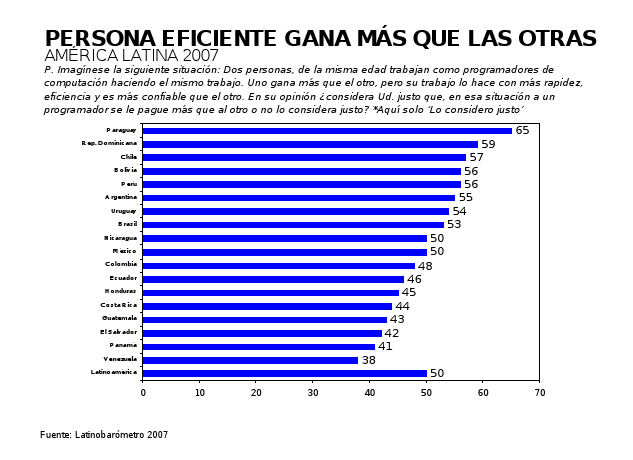
Satisfaction with access to education
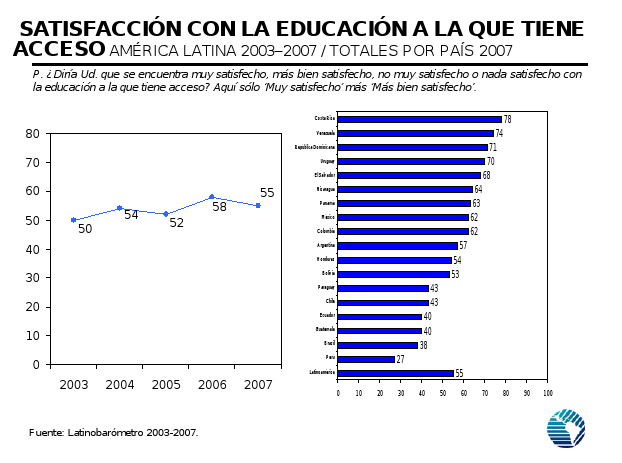
Satisfaction with access to health
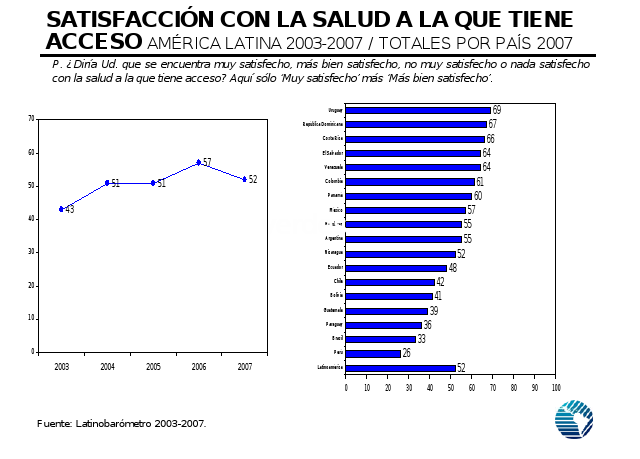
Been a victim of corruption
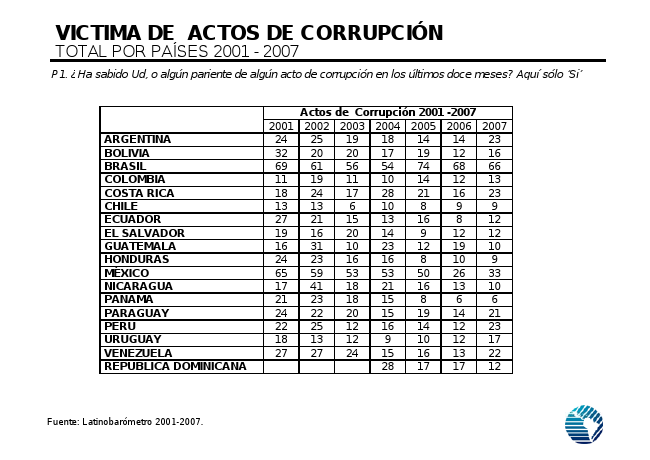
Been a victim of crime
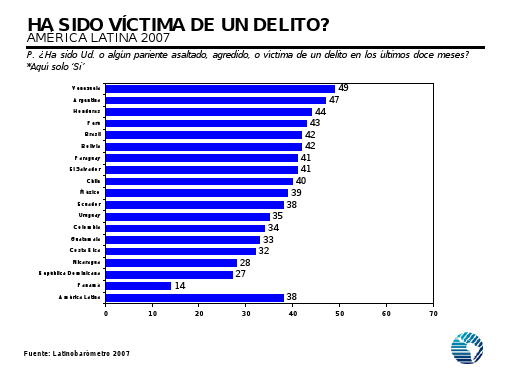
Worry about violence
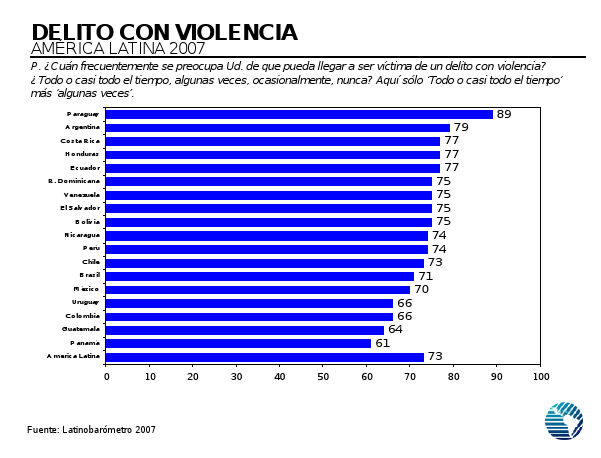
Everybody has access to justice
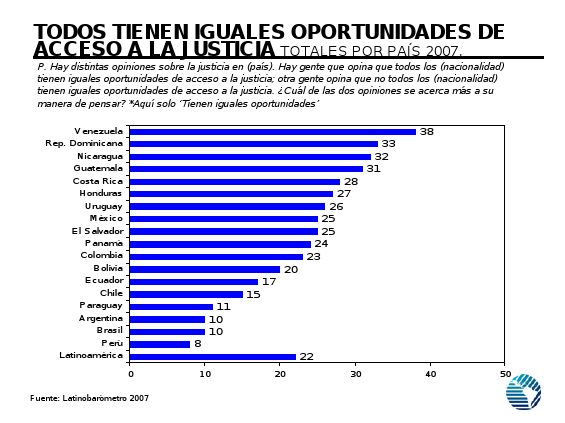
Trust political parties (massive reversal Katy would jump for joy, if it were trust in HER party)
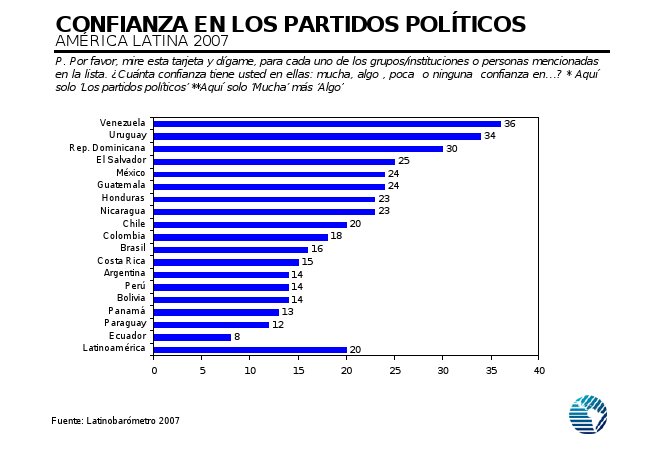
Perception of Chavez in the region, on par with Bush.
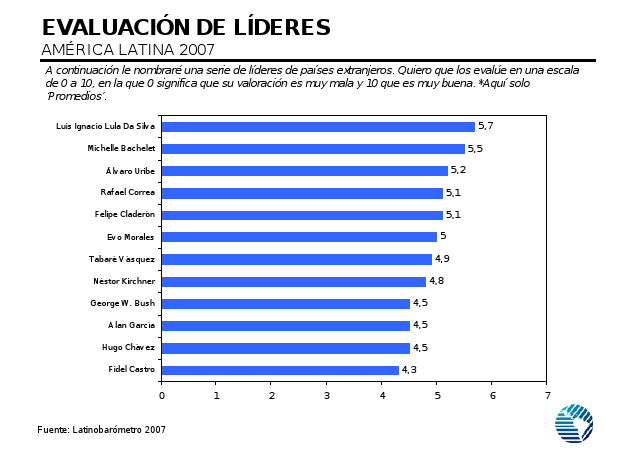
President vs govt.
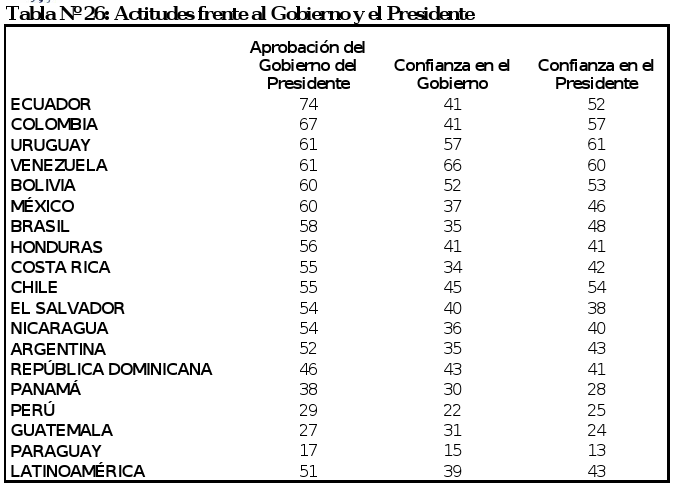
Government approval
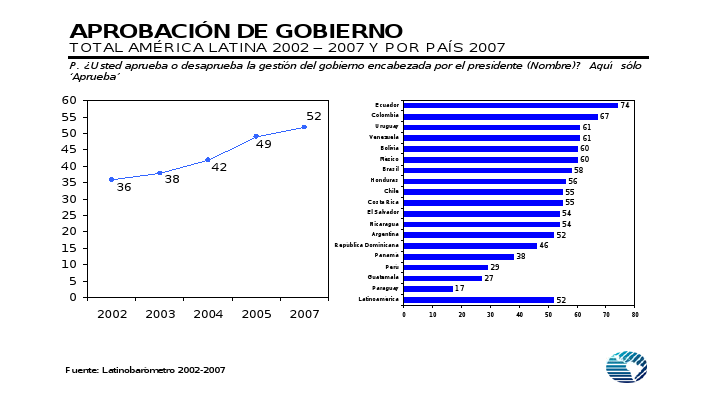
Satisfaction with basic services
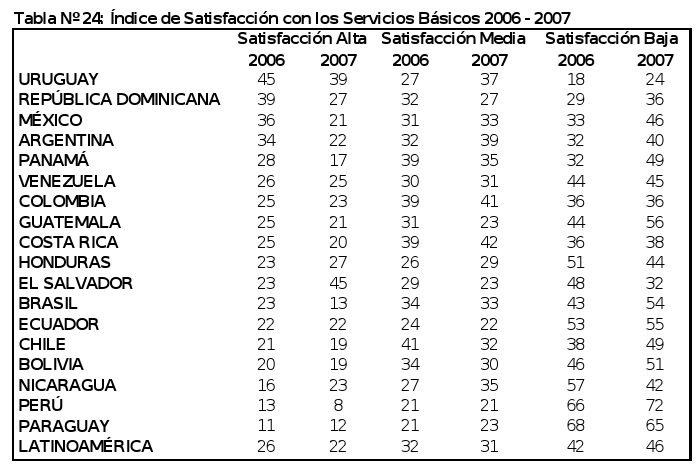
Attitude with regards to democracy
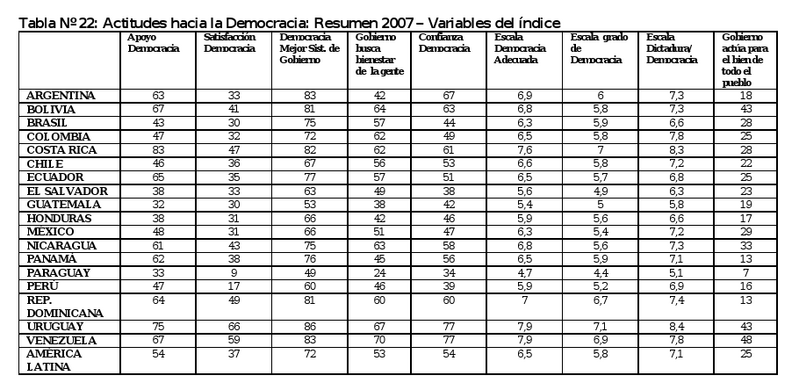
Where do you sit on the left-right scale (10 bad guys)
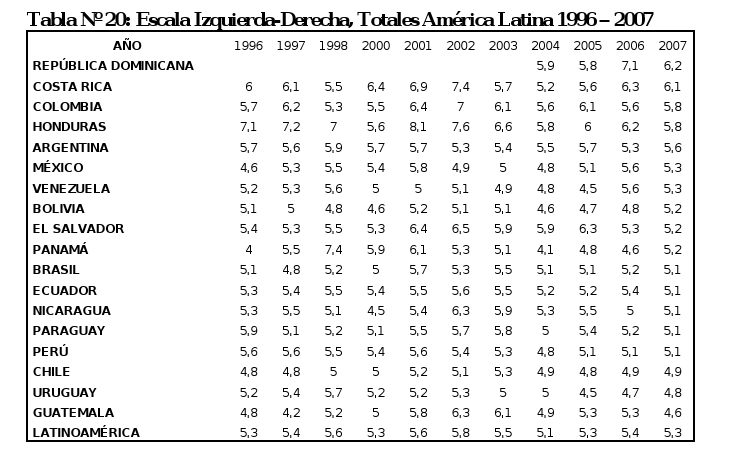
Class conflicts
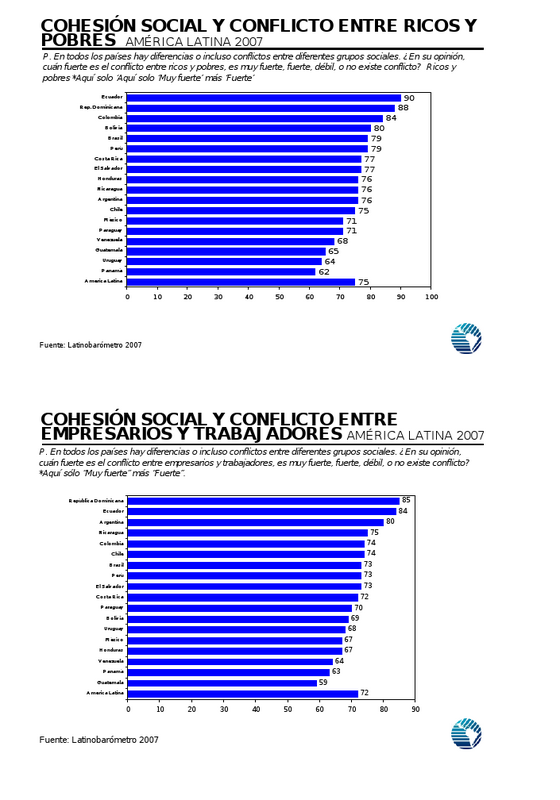
Is income distrubution fair
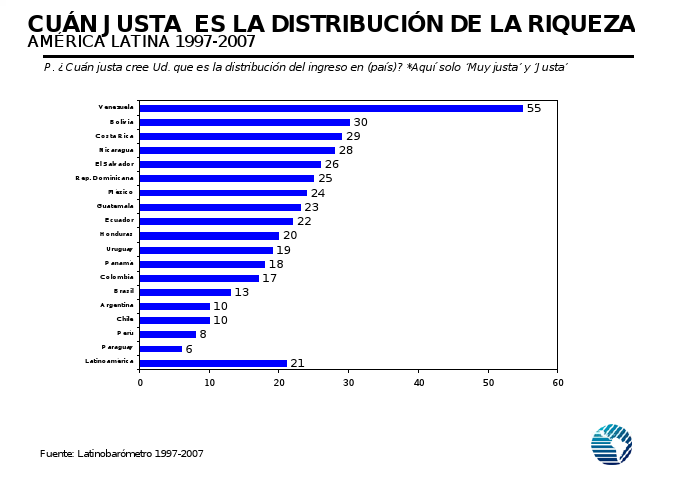
Private industry important for growth
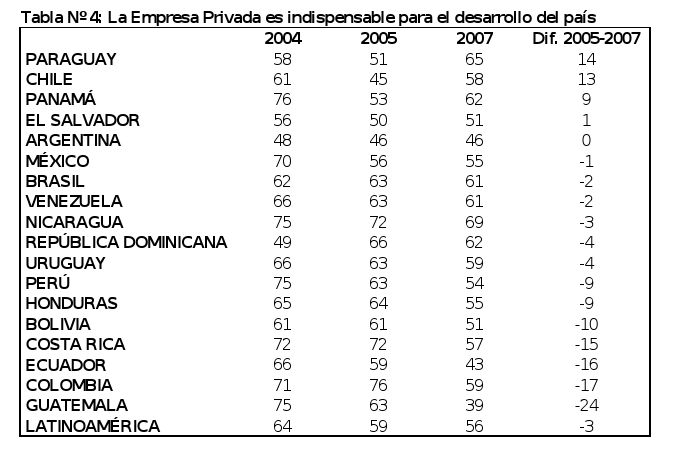
State can solve everything
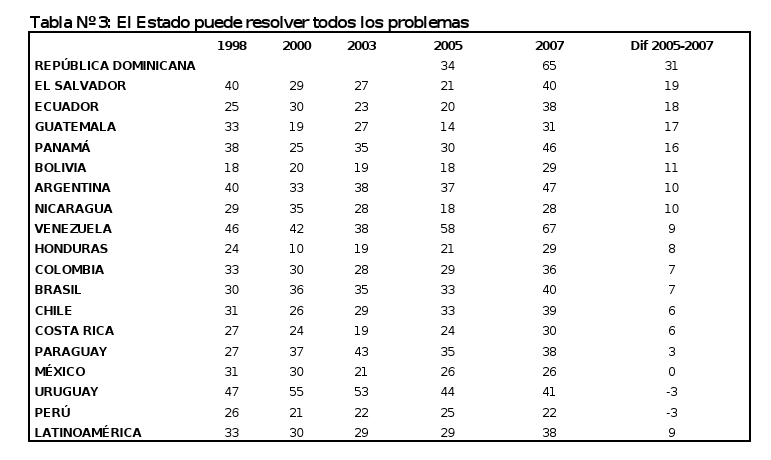
Free Market only way towards development
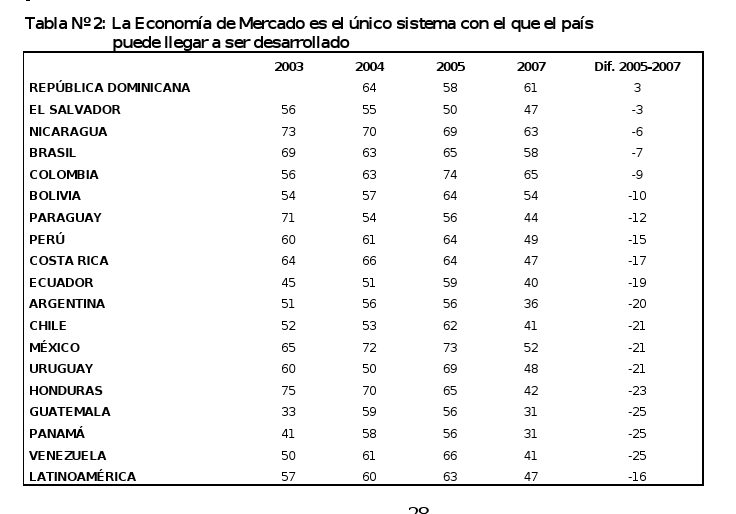
Privatizations have been benefitial
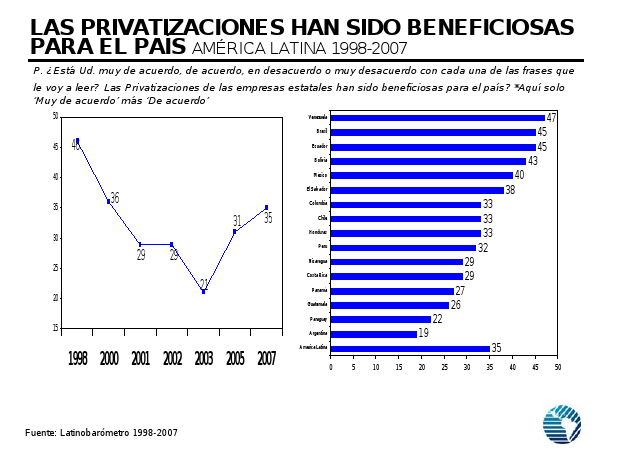
Market economy is better
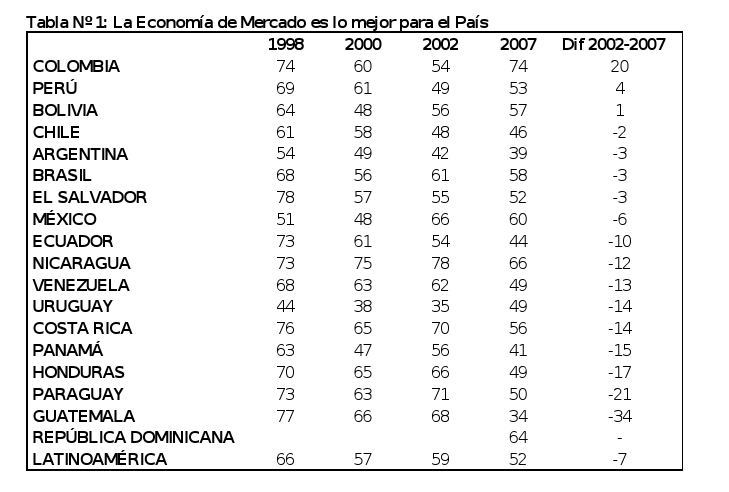
The most important problem
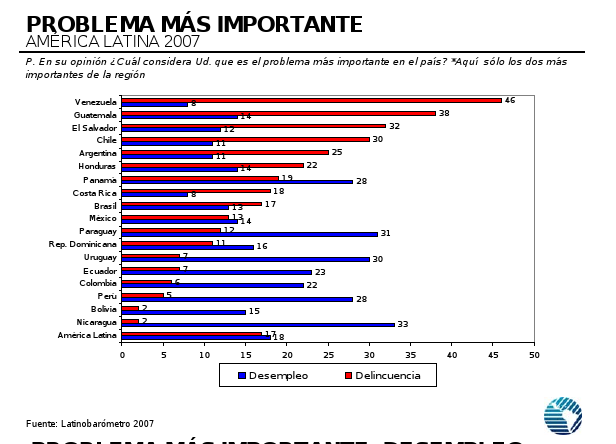
Economic outlook (Family)
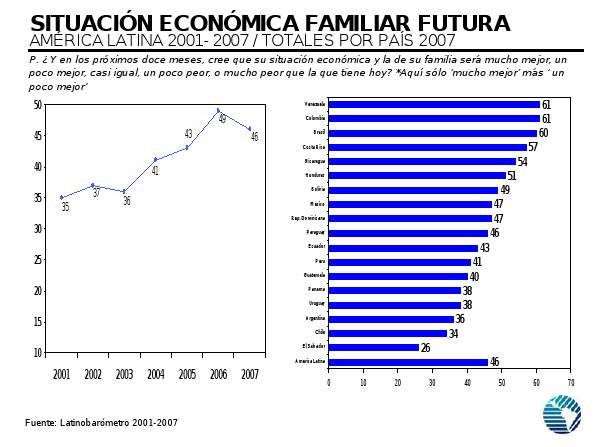
Economic outlook (country)
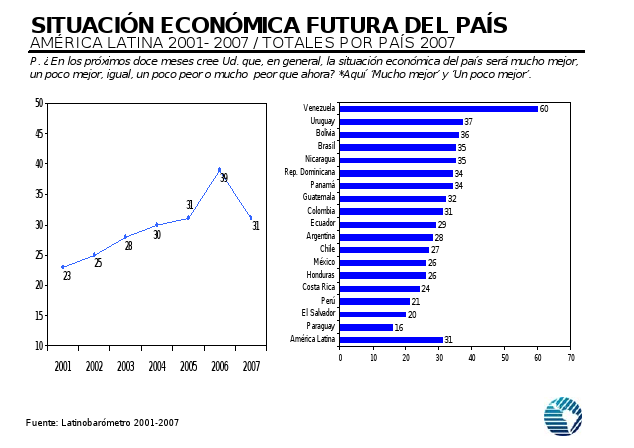
State of the economy
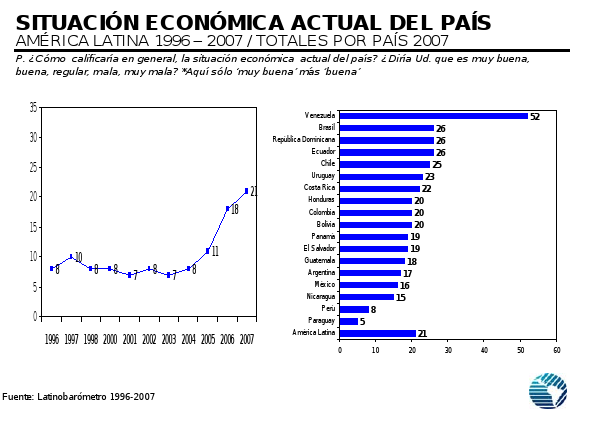
|
Link
The more efficient person should win more.

Satisfaction with access to education

Satisfaction with access to health

Been a victim of corruption

Been a victim of crime

Worry about violence

Everybody has access to justice

Trust political parties (massive reversal Katy would jump for joy, if it were trust in HER party)

Perception of Chavez in the region, on par with Bush.

President vs govt.

Government approval

Satisfaction with basic services

Attitude with regards to democracy

Where do you sit on the left-right scale (10 bad guys)

Class conflicts

Is income distrubution fair

Private industry important for growth

State can solve everything

Free Market only way towards development

Privatizations have been benefitial

Market economy is better

The most important problem

Economic outlook (Family)

Economic outlook (country)

State of the economy

|
Sunday, November 18, 2007
Desperate is as desperate does
A few years back while seeking refuge from the extreme heat of Maracaibo Venezuela I did some movie watching. I'm not big on movies but just the chance to briefly escape the heat made the price of the ticket worth it.
I did find one thing interesting though. Rather than showing trailers of upcoming movies as they generally do in the U.S. they showed anti-Chavez infomercials. "Well, this just goes to show how desperate the anti-Chavez Venezuelan opposition is" I thought. Fortunately in the sophisticated north we still get to watch previews of upcoming movies rather than having to sit through crude brainwashing attempts.
Or so it was. Now even in the U.S. we have to sit through propoganda infomercials. Friday night I discovered that when they showed this slick pro-war, pro-military music video from the U.S. National Guard before a movie I went to see that night:
In fact, just for people who might be a little slow they played it twice.
After watching it I guess we were supposed to hope all the young people in the audience ran out and joined the National Guard to protect America against 9/11 terrorists (you sure can't have missed that linkage in the video can you?).
And I guess it is supposed to be reassuring that "we won't accept defeat" now anymore than we did after Valley Forge.
Nevertheless, even the catchy music couldn't keep this video from looking a little desperate - just like the very polished ads in Maracaibo did just before the Venezuelan opposition got rolled in the Recall Referendum.
Also, should the U.S. military really be running ads highlighting the American Revolutionary War? I guess the irony of playing up an insurgency fighting an occupying army is lost on the people in the Pentagon these days.
Lynne Cheney actually write childrens books about the Revolutionary War. Maybe she should remind the blockheads who came up with this who won that war.
|
I did find one thing interesting though. Rather than showing trailers of upcoming movies as they generally do in the U.S. they showed anti-Chavez infomercials. "Well, this just goes to show how desperate the anti-Chavez Venezuelan opposition is" I thought. Fortunately in the sophisticated north we still get to watch previews of upcoming movies rather than having to sit through crude brainwashing attempts.
Or so it was. Now even in the U.S. we have to sit through propoganda infomercials. Friday night I discovered that when they showed this slick pro-war, pro-military music video from the U.S. National Guard before a movie I went to see that night:
In fact, just for people who might be a little slow they played it twice.
After watching it I guess we were supposed to hope all the young people in the audience ran out and joined the National Guard to protect America against 9/11 terrorists (you sure can't have missed that linkage in the video can you?).
And I guess it is supposed to be reassuring that "we won't accept defeat" now anymore than we did after Valley Forge.
Nevertheless, even the catchy music couldn't keep this video from looking a little desperate - just like the very polished ads in Maracaibo did just before the Venezuelan opposition got rolled in the Recall Referendum.
Also, should the U.S. military really be running ads highlighting the American Revolutionary War? I guess the irony of playing up an insurgency fighting an occupying army is lost on the people in the Pentagon these days.
Lynne Cheney actually write childrens books about the Revolutionary War. Maybe she should remind the blockheads who came up with this who won that war.
|
